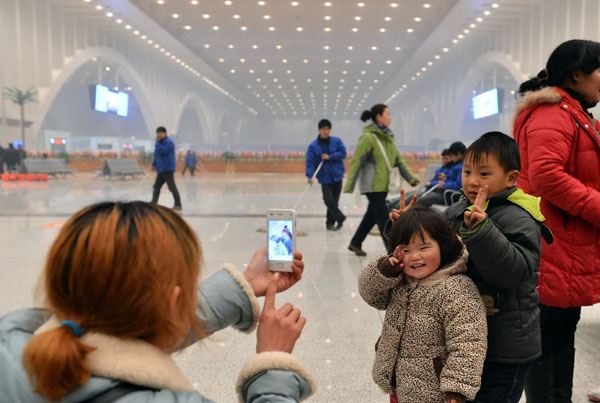Tracking changes at a railway station
Updated: 2012-12-27 10:09
By Zheng Jinran and Pei Pei in Shijiazhuang (China Daily)
|
|||||||||||
 |
|
Young passengers pose for pictures at the new Shijiazhuang railway station. It started operation on December 21in preparation for the first high speed trains from Beijing to Guangzhou, which will pass through the city from Dec 26.[Photo by Chen Tengfei/China Daily]. |
Among the flood of passengers streaming out of the new Shijiazhuang railway station, there is a young woman who stands out. She is not rushing in or out, nor is she burdened with luggage. Instead, she is busy taking photographs.
Every time Zhang Xin had taken a train from her hometown to Beijing where she has been working in the last two years, she had stopped to take pictures of the train station.
"I record the dramatic changes at the station for my own collection," the 25-year-old says, as she snaps more shots of the brand-new turnstiles.
"The better service at the new station reminds me of the Beijing South Station, and it's comfortable and convenient," she says.
Shijiazhuang, once a tiny village of about 600 people, was put on the map in 1902 when the railway connecting Beijing and Wuhan was built. Then more lines were built, making the little place a railway hub in northern China.
Soon, the city will see another boom as the high speed train from Beijing to Guangzhou, which will pass through Shijiazhuang, starts running on Dec 26.
More than 280 trains, including about 60 pairs of high speed trains, will stop at the new station every day, from which more than 50,000 passengers will board the trains or disembark.
"The new high speed rail and the new station give us the chance to improve the environment and serve the passengers better," says Li Xiaogang, director of the Shijiazhuang railway project bureau.
|
|
|
Related Stories
Beijing-Guangzhou high-speed trains to start operating 2012-11-20 16:21
Beijing-Shanghai high-speed train tickets cheaper 2012-06-17 21:31
China Mobile sets up first 4G network for high-speed trains 2012-12-07 15:49
Lei Feng spirit lives on in small railway station 2012-04-17 15:29
Dalian North Railway Station to open 2012-09-06 10:08
Today's Top News
Rescuers race against time for quake victims
Telecom workers restore links
Coal mine blast kills 18 in Jilin
Intl scholarship puts China on the map
More bird flu patients discharged
Gold loses sheen, but still a safe bet
US 'turns blind eye to human rights'
Telecom workers restore links
Hot Topics
Lunar probe , China growth forecasts, Emission rules get tougher, China seen through 'colored lens', International board,
Editor's Picks

|

|

|

|

|

|







